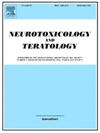有机磷化合物和神经系统疾病:化身博士和海德先生。
IF 2.8
3区 医学
Q3 NEUROSCIENCES
引用次数: 0
摘要
本文综述了有机磷(OPs)作为药物的用途、毒理学和神经学效应。OPs是一个多用途的化学家族,已应用于许多领域,但具有重大风险,特别是对神经系统。在本文的第一部分,我们讨论了OPs的毒理学效应,特别是它们对乙酰胆碱酯酶(AChE)酶的抑制作用,导致严重的神经损伤。事实上,长期接触这些化学物质会引发神经炎症、氧化应激和神经递质系统的变化,导致认知缺陷、神经精神障碍,甚至可能导致神经变性。在第二部分中,我们讨论了这些化学物质的治疗潜力,主要关注它们对中枢神经系统(CNS)的影响。一些自然产生的化合物,如胞胆碱,已经显示出神经保护特性,而合成的OPs,如双膦酸盐及其衍生物,正在被探索用于治疗一些精神疾病。然而,其中一些药物的高毒性和副作用,无论是短期还是长期,都可能限制其在临床环境中的使用。总之,我们呼吁建立更好的动物模型,并继续研究开发更安全的治疗方案。本文章由计算机程序翻译,如有差异,请以英文原文为准。
Organophosphorus compounds and neurological conditions: Dr. Jekyll and Mr. Hyde
This article reviews the use, toxicology, and neurological effects of organophosphates (OPs) used as pharmacological agents. OPs, a versatile chemical family, have been applied in many sectors but pose significant risks, particularly to the nervous system. In the first part of this review, we discuss the toxicological effects of OPs, particularly their inhibition of the acetylcholinesterase (AChE) enzyme, leading to severe neurological impairments. Indeed, prolonged exposure to these chemicals can trigger neuroinflammation, oxidative stress, and changes in neurotransmitter systems, resulting in cognitive deficits, neuropsychiatric disorders, and, potentially, neurodegeneration. In the second part, we address the therapeutic potential of these chemicals, focusing mainly on their effects on the central nervous system (CNS). Some naturally occurring compounds, like citicoline, have shown neuroprotective properties, while synthetic OPs such as bisphosphonates and their derivatives are being explored to treat some mental conditions. However, the high toxicity and side effects of some of them, whether in the short or long term, may limit their use in clinical settings. Overall, there is a call for better animal models and continued research to develop safer therapeutic options.
求助全文
通过发布文献求助,成功后即可免费获取论文全文。
去求助
来源期刊
CiteScore
5.60
自引率
10.30%
发文量
48
审稿时长
58 days
期刊介绍:
Neurotoxicology and Teratology provides a forum for publishing new information regarding the effects of chemical and physical agents on the developing, adult or aging nervous system. In this context, the fields of neurotoxicology and teratology include studies of agent-induced alterations of nervous system function, with a focus on behavioral outcomes and their underlying physiological and neurochemical mechanisms. The Journal publishes original, peer-reviewed Research Reports of experimental, clinical, and epidemiological studies that address the neurotoxicity and/or functional teratology of pesticides, solvents, heavy metals, nanomaterials, organometals, industrial compounds, mixtures, drugs of abuse, pharmaceuticals, animal and plant toxins, atmospheric reaction products, and physical agents such as radiation and noise. These reports include traditional mammalian neurotoxicology experiments, human studies, studies using non-mammalian animal models, and mechanistic studies in vivo or in vitro. Special Issues, Reviews, Commentaries, Meeting Reports, and Symposium Papers provide timely updates on areas that have reached a critical point of synthesis, on aspects of a scientific field undergoing rapid change, or on areas that present special methodological or interpretive problems. Theoretical Articles address concepts and potential mechanisms underlying actions of agents of interest in the nervous system. The Journal also publishes Brief Communications that concisely describe a new method, technique, apparatus, or experimental result.

 求助内容:
求助内容: 应助结果提醒方式:
应助结果提醒方式:


